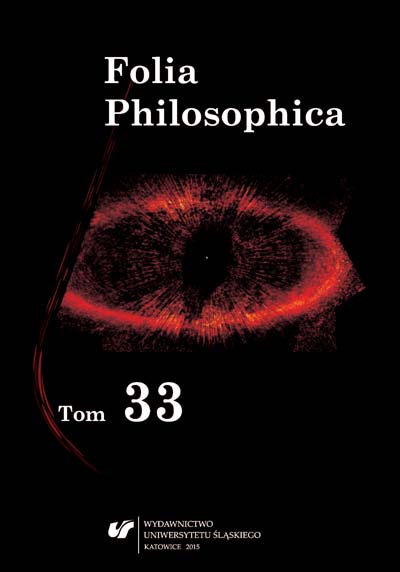O możliwości rozwiązania aporii monizmu gnozeologicznego w filozofii Plotyna
About the Possibility of Solving Aporia of Gnoseological Monism on the Grounds of Plotinus’s Philosophy
Author(s): Rafał OleśSubject(s): Philosophy
Published by: Wydawnictwo Uniwersytetu Śląskiego
Keywords: Plotinus; gnoseological monism; metaphysics; self-knowledge; Absolute
Summary/Abstract: Cognition assumes difference between the subject and the object and their unity at the same time; gnoseological monism is a thesis about extra-subjective and extra-objective grounds for this unity; aporia of gnoseological monism prompts one to choose: either is the subject-object difference contained in One or One is „an empty X” resembling nothingness. On the basis of Plotinus’s philosophy the subject-object difference is the first form of relativity; the difference is then established together with the Mind’s knowledge about the subject (the second part of the article). The relativity of the subject and the object becomes expressed in the aporia of self-knowledge which may be presented in a form of a question: how is multitude (subject and objects) a unity (self-knowlegde)? A solution to this problem comes down to demonstrating that without self-knowledge, there is no knowledge: self-knowledge is essential to recognize knowledge about one’s attitude towards their own cognition as true or false — and more broadly, “noetic self-knowledge” is essential to recognize knowledge of the Mind about the approach towards being as truth. In the third part of the article the act of noetic perception (and, more precisely “noetic clarity”) is analysed in the light of two conceptions of principles: principle as a sufficient rationale, and principle as a source of value of something. “Noetic clarity” is simultaneously a direct and rational cognition (unity of things-reasons and things-contents); “clear” is everything that is given together with its rationale; but, at the same time, every being — in noetic depiction — evinces the power of completing scarcities with some defined good (realizing the second sense of the principle — that every being appears as a certain self-consolidating power, that constitutes a value in and of itself). Both these aspects of noetic clarity indicate One as its basis (the thesis of gnoseological monism) and, simultaneously — by means of axiological characteristic of perception itself — allow for regarding One as “something more” than “an empty X”, that is, as Good.
Journal: Folia Philosophica
- Issue Year: 2015
- Issue No: 33
- Page Range: 145-168
- Page Count: 24

